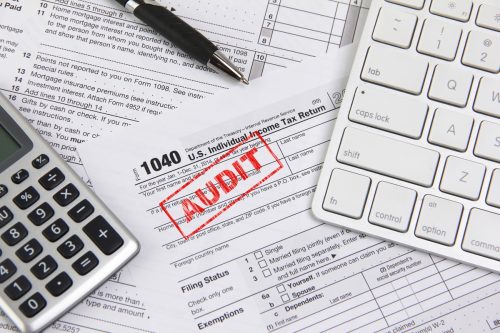IRS Warns That Claiming These Credits Can Get You Audited and Fined

Procrastinators, take note: The 2023 tax season is nearing its final month. But don’t let that fast-approaching deadline lead to you making mistakes on your return. The Internal Revenue Service (IRS) has issued multiple warning about the tax errors to avoid this year—and when it comes to incorrectly claiming certain credits, the penalties could be serious. Now, a new alert warns about credits that could get you audited and fined. Read on to find out what you’ll want to steer clear of on your tax return.
READ THIS NEXT: Taking These 2 Deductions Could Get You Audited by the IRS, Experts Warn.
Credits can help you lower what you pay in taxes.

As taxpayers know well, credits can really help you out come tax time—which is why financial experts advise against letting those you’re eligible for go unclaimed.
“Credits can reduce the amount of tax you owe,” the IRS explains. This means you could end up significantly lowering how much you have to pay in taxes when filing your return, according to the agency.
Some credits may also be refundable or partially refundable, meaning you could actually end up getting money back from the IRS. If you claim certain credits on your tax return, “you may be able to get a larger refund, while others may give you a refund even if you don’t owe any tax,” the agency states.
Credits don’t come without risk, however. In fact, claiming credits you’re not eligible for could get you in major trouble with the IRS.
The IRS warns taxpayers about claiming certain credits.

Scammers have been steadily pushing people to claim credits they aren’t actually eligible for this year. In a March 23 press release, the IRS warned about a common tax scam involving third-party promoters of false fuel tax credit claims.
“The fuel tax credit is meant for off-highway business and farming use and, as such, is not available to most taxpayers,” the agency explained. “However, unscrupulous tax return preparers and promoters are enticing taxpayers to inflate their refunds by erroneously claiming the credit.”
The IRS said it has seen a significant increase in scammers convincing taxpayers to fraudulently claim this credit by promising them that they will get a larger refund. But in reality, these con artists are looking to cash in on inflated fees, refund fraud, and identity theft.
“These scammers will often charge a hefty fee for these bogus claims, and participants also face the possibility of identity theft. This is another example that people should always remember: Be wary if a tax deal sounds too good to be true,” IRS Commissioner Danny Werfel said in a statement.
RELATED: For more up-to-date information, sign up for our daily newsletter.
The agency has made alerts about other similar scams.

On March 20, the IRS sounded the alarm on another scam, this time in regards to “widely circulating promoter claims involving Employee Retention Credits.”
According to the IRS, scammers have been pushing ads on the radio and the internet where they promote services targeted to help taxpayers claim the Employee Retention Credit (ERC)—whether qualified or not. The ERC was introduced in 2020, and was designed to incentivize employers to “keep employees on their payroll despite experiencing an economic hardship related to COVID-19” by making them eligible for new credits.
“The aggressive marketing of these credits is deeply troubling and a major concern for the IRS,” Werfel said. “While the credit has provided a financial lifeline to millions of businesses, there are promoters misleading people and businesses into thinking they can claim these credits. There are very specific guidelines around these pandemic-era credits; they are not available to just anyone.”
The IRS also revealed that a wage-based scam is pushing people to falsely claim a credit that isn’t even available this year. According to the agency, this scheme encourages taxpayers to misuse their W-2 information to claim sick leave and family leave credits meant for certain self-employed individuals.
“These credits were available for self-employed individuals for 2020 and 2021 during the pandemic; they are not available for 2022 tax returns,” the IRS warned.
Falsely claiming credits can get you audited and fined.

The IRS is ramping up its efforts to catch fraudulent credit claims on tax returns in 2022. The agency said its processing systems “are now stopping a significant number of suspicious fuel tax credit refund claims,” while its Small Business/Self-Employed division has trained auditors to thoroughly examine ERC claims.
“People should remember the IRS is actively auditing and conducting criminal investigations related to these false claims,” Werfel warned. “We urge honest taxpayers not to be caught up in these schemes.”
Whether or not they’ve been tricked by a scammer, taxpayers are ultimately liable for false credit claims. “Taxpayers should remember that they are always responsible for the information reported on their tax returns,” Werfel explained, adding that improperly claiming certain credits could result in them having to pay penalties.
But that might not be the worst outcome for taxpayers. “Returns filed by individuals and tax preparers who knowingly claim a credit to which they are not entitled may face fines and even be subject to federal criminal prosecution and imprisonment,” the IRS warned.
Best Life offers the most up-to-date financial information from top experts and the latest news and research, but our content is not meant to be a substitute for professional guidance. When it comes to the money you’re spending, saving, or investing, always consult your financial advisor directly.
- Source: https://www.irs.gov/credits-and-deductions
- Source: https://www.irs.gov/newsroom/dirty-dozen-watch-out-for-third-party-promoters-of-false-fuel-tax-credit-claims
- Source: https://www.irs.gov/newsroom/irs-opens-2023-dirty-dozen-with-warning-about-employee-retention-credit-claims-increased-scrutiny-follows-aggressive-promoters-making-offers-too-good-to-be-true
- Source: https://www.irs.gov/newsroom/attempting-this-w-2-scam-can-lead-to-penalties-for-taxpayers